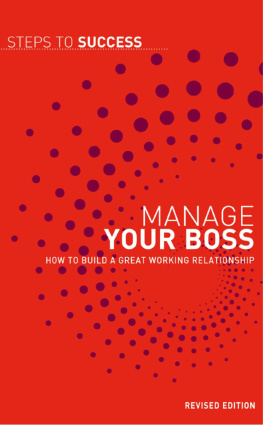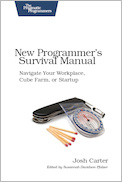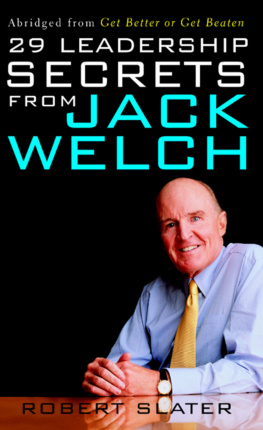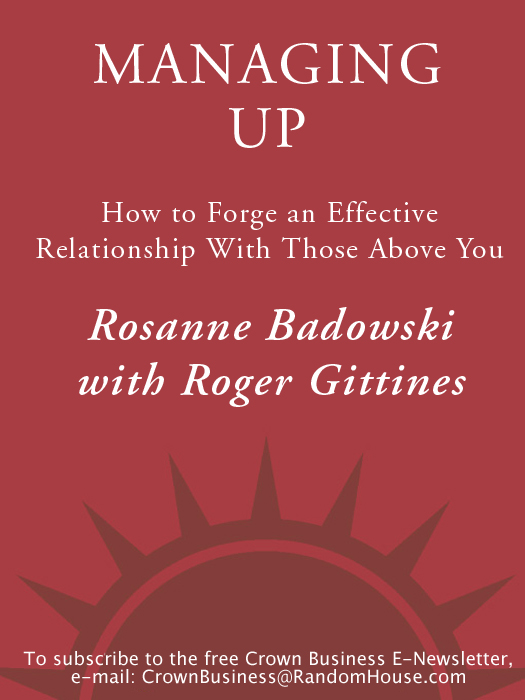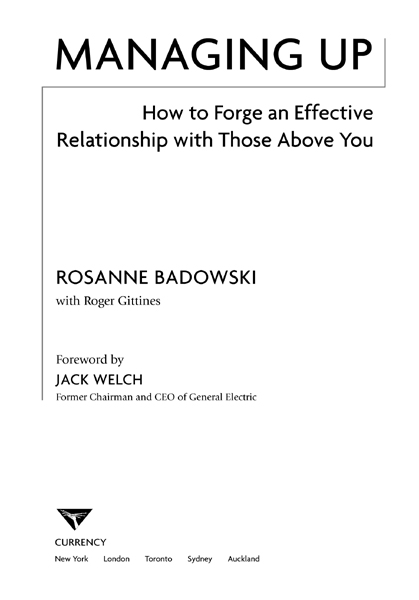A C URRENCY B OOK
PUBLISHED BY DOUBLEDAY
a division of Random House, Inc.
C URRENCY is a trademark of Random House, Inc., and D OUBLEDAY is a registered trademark of Random House, Inc.
Managing Up was originally published in hardcover by Currency in March 2003.
The Library of Congress has cataloged the hardcover edition of this book as follows:
Badowski, Rosanne.
Managing up: how to forge an effective relationship with those above you / by Rosanne Badowski with Roger Gittines ; foreword by Jack Welch.1st ed.
p. cm.
1. Managing your boss. 2. Interpersonal relations. 3. Career development. 4. Welch, Jack, 1935 I. Gittines, Roger. II. Title.
HF 5548.83 .B33 2003
650.13dc21 2002035088
eISBN: 978-0-385-50882-7
Copyright 2003 by Rosanne Badowski
All Rights Reserved
All trademarks are the property of their respective companies.
v3.1
To Tekla and John, my parents in heaven
CONTENTS
FOREWORD
A FEW MONTHS AGO, when Rosanne told me she was writing a book, I said greatas long as it wasnt about me, and as long as I didnt have to do anything for it. Now Ive read the book, and it says plenty about me, and I am sitting here writing the foreword. So you can see who was actually the boss in our relationship.
Of course, Rosanne would never say that herself. The book you are about to read refers to me as the boss and gives all sorts of advice about how to manage up. FineIm not going to argue with Rosanne in her own book. But the facts are, any successful collaboration between a boss and an assistant is a lot less hierarchical than it looks from the outside. For fourteen fantastic years, Rosanne and I were nothing less than partners. She may have been managing me up, and perhaps I managed her down, but most of the time we were both managing sideways, the way teammates do. We passed the ball back and forth, blocked for each other, shouted directives and encouragement (and occasional expletives), suffered together after losses, and, perhaps most of all, shared in the victories. I may have been her boss and she may have been my executive assistant, but it sure didnt feel that way. Maybe thats why our time together was so much fun. No question, that is why it worked.
Since my retirement from GE in September 2001, Ive spent a lot of time traveling around the United States, Europe, and Latin America, to meet with managers and employees at all levels of an organization, in groups ranging in size from twelve to five thousand. Im not a big fan of giving speechesin fact, I havent given one in yearsso my main way of operating is to sit in front of an audience and take questions. Talk about energizing! It is thrilling to see how many people are passionate about improving their companies. In fact, despite the highly publicized cases of corruption that came to light in the wake of the stock markets decline, I am confident that most people in business are truly decent, honest, and hardworking. Any incidence of corporate malfeasance is despicable, but from all my experience, I am convinced that the vast majority of working people, from the mailroom to the boardroom, understand the value of integrity and apply that value as they help their companies grow and prosper.
During these Q&A sessions, I am, for obvious reasons, mainly asked about GE and its way of doing business. Rosanne talks a lot about GE in this book as well. But Managing Up is not just about GE. More than that, its about being effective. I never had a boss who asked me to schedule ten meetings in one day, or get him from Pittsfield to Tokyo by the next morning, or juggle three ringing phones at once, thirty visitors a week, and five hundred e-mails a day. If one had, my foray into the business world probably would have lasted about ten minutes.
In this book, Rosanne covers every base. She describes exactly what she did to make our partnership work. Any assistant could heed her advice and make his or her boss burst from gratitude.
My only issue is that Rosanne leaves out three personal qualities that infused everything she did, qualities that made her even more effectiveeven more of a partner. (Theyre not mentioned, I would guess, because Rosanne is annoyingly modest.) Rosanne wasand any great assistant has to beloyal, discreet, and forgiving. And not just a little of any of these, but a huge amount.
Loyalty is hard to interview for, and Im not going to make the case here that I was even looking for it when I met Rosanne. I was trying to get a sense of her character, and I knew I wanted to work with someone who cared as passionately about GE and its mission and its results as I did. Thats what I mean by loyaltya kind of crazy, unrelenting zeal that makes you put the job first. The truth is, I did not want an assistant who thought of her job as nine-to-five, because I didnt. I wanted someone who lived and breathed work, because work was so exciting and important. I wanted a secretary so loyal to the GE way and GE people that she could read my mind, because she was that loyal.
You may be thinking that this kind of assistant is crazy. After all, what does she get for her loyalty? The boss gets money and prestige, not to mention all the credit. She gets long hours, short weekends, less pay, and little if any recognition. I would have to guess, however, that assistants who act with passion, zeal, and dedication consider their commitmentand its resultsto be its own reward. When you care a lot, being at work becomes damn exciting. More than that, work becomes a calling, not a job. Now, that kind of loyalty may not be for you, but Ive seen it in every great assistant I have ever known.
For an assistant, the quality of discretion is an absolute must, but Im not saying that makes it easy. People in Rosannes position usually know everythingfrom major strategic decisions to the most delicate personnel issuesand everything is what people often try to get out of them. You cant imagine the number of times I would walk by Rosannes desk to hear her telling someone on the phone, I have no idea, or I really couldnt answer that. Her lock on information was airtight. She understood that even the smallest rumor emanating from her desk could and would travel fast through the organization, and in the process might even sink a deal or hurt a career. In thirteen years, I can honestly say that not a single word out of my mouth, not a single piece of paper or e-mail that passed my desk, was ever repeated by Rosanneuntil this book, that is.
When I think about the importance of discretion, literally dozens of stories come to mind, but one really sticks outthe succession process for GEs CEO. For the last year of this race, as it was called in the papers, everyone knew that the candidates were three sensational GE executives, Bob Nardelli, Jim McNerney, and Jeff Immelt. The stakes were high, and not just for the three candidates. Many people in the organization knew the choice would drive GEs strategy for the next decade or two, and with it, many peoples careers.


